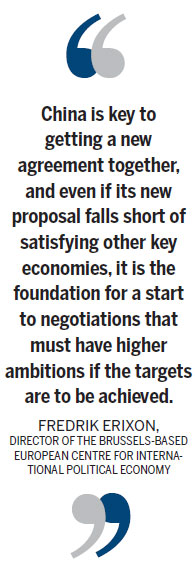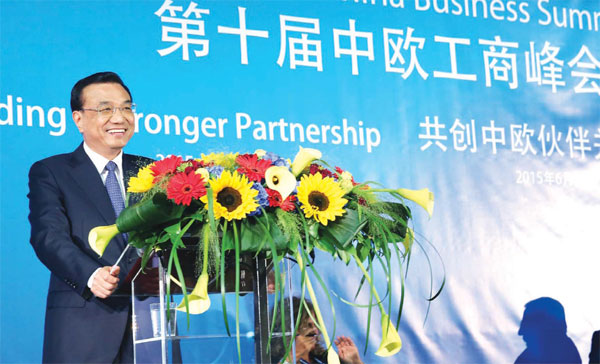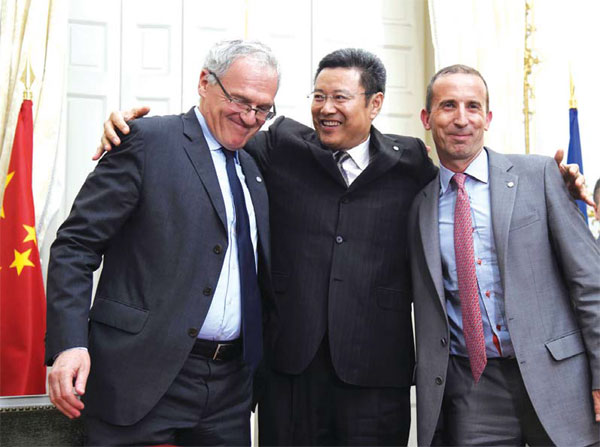China's energy goals 'ambitious'





Premier vows in Paris to make major cuts in consumption per output unit, which is expected to boost UN climate talks later this year
In Paris, visiting Chinese Premier Li Keqiang vowed on June 30 to cut the nation's energy consumption per unit of economic output by 60 to 65 percent from its 2005 base, while committing to reach a carbon emissions peak by 2030 or earlier if possible.
China's targets are ambitious and responsible, according to insiders, and will provide great impetus for successful United Nations climate talks in Paris in December.
| Premier Li Keqiang and his Brussels counterparts made joint statements on climate change on June 29 at the conclusion of the EU-China summit. Yao Dawei / Xinhua |
Li and his Brussels counterparts made joint statements on climate change on June 29 at the conclusion of the EU-China summit, following the pattern of Beijing's climate partnership with Washington that produced November's joint announcement on reductions.
Li released Beijing's carbon emission reduction goals the following day, after meeting with French President Francois Hollande in Paris, which will host the UN talks. The targets were submitted to the UN that day.
"I am very happy that Premier Li has announced the ambitious targets in my city, which this year has shouldered the great task of saving this planet," says Pierre Calame, president of the China Europa Forum Foundation based in Paris.
Calame calls Li's announcement "good news and big news. I have seen the Chinese government's serious commitment".
Realizing such cuts is heavily dependent on a change in the way of life for Chinese people, he says. "And also it is depends on China's upgrading of its economic structure."
Calame says that in addition to China's efforts, the United States and Europe should cut their absolute amount of energy consumption if they are serious about fighting climate change.
The 60 to 65 percent energy intensity target is one of the key points of China's intended nationally determined contributions, or INDCs, an action plan submitted to the Secretariat of the UN Framework Convention on Climate Change.
That goal is a big step beyond China's previous emissions control target, which eyes a decrease of 40 to 45 percent from the 2005 level by 2020. Last year, carbon emissions per unit of GDP were 33.8 percent lower than the 2005 level.
The enhanced actions "represent its (China's) utmost efforts in addressing climate change", according to the nation's INDC report.
It also says that action on climate change is driven by China's domestic needs to ensure economic and ecological security, as well as by its sense of responsibility to fully engage in global governance, according to the document.
China's move came amid calls for faster progress on climate talks ahead of the key UN conference in Paris late this year, when the UN hopes the international community will reach a new, universally binding climate pact with a long-term goal of limiting the maximum global average temperature increase to no more than 2 C above pre-industrial levels.

All parties are expected to submit their INDCs before the Paris meeting. However, as of June 29, only 39 countries of the 196 parties to the convention had submitted their INDCs, according to a UN website.
China's special representative on climate change, Xie Zhenhua, has noted that there is "very little time between now and the Paris conference", urging all parties to submit their INDCs and strengthen their implementation.
The United States has announced a target of cutting its emissions by 26 to 28 percent from its 2005 level by 2025, while the EU eyes a reduction of at least 40 percent by 2030 on the basis of its 1990 levels.
The Paris agreement should set quantified targets and a road map for developed countries' financial support to developing countries in the fight against climate change, according to United Nations documents relating to the Green Climate Fund.
The fund is within the framework of the UN Framework Convention on Climate Change. It was founded as a way to redistribute money from the developed world, to assist developing countries with ways to counter climate change.
It also says the scale of financing should increase yearly, starting from $100 billion (90 billion euros) per year from 2020, and that the fund should primarily come from public finance.
China has reached out to other developing countries to help them cope with climate change. Since 2011, China has invested some $44 million in south-south cooperation and provided assistance to other developing countries through low-carbon products, training and capacity building.
Zhang Jianyu, China's representative on the Environmental Defense Fund, an organization based in New York, compares Li's announcement with the joint statement between China and the US last year, when China said it would fulfill its energy intensity target by 2030.
"This is very encouraging and I hope the announcement will help encourage more countries to unveil their targets," Zhang says.
Fredrik Erixon, director of the Brussels-based European Centre for International Political Economy, says China is clearly making a serious pitch to assume responsibility in global climate change politics.
"While there does not seem to be much news in the new plan, its combination of various contributions allow for a meaningful negotiation at the Paris summit later this year," says Erixon.
"China is key to getting a new agreement together, and even if its new proposal falls short of satisfying other key economies, it is the foundation for a start to negotiations that must have higher ambitions if the targets are to be achieved."
In Paris, Li also repeated China's goal of trying to curb its carbon emissions before 2030.
"China's carbon dioxide emissions will peak by around 2030, and China will work hard to achieve the target at an even earlier date," Li says.
China also aims to increase the share of nonfossil fuels in its primary energy consumption mix to about 20 percent by 2030.
Alex Kirby, a retired BBC environmental journalist, says: "China deserves great credit for what it plans to do, and what it has done already, to reduce its emissions and to uncouple productivity from fossil fuel use."
Now, as founder and editor of the Climate News Network, Kirby cited his recent website report as saying that a significant threshold has been crossed by renewable energy, because analysts report that the sector size last year reached double the level it was just 10 years earlier.
The expansion happened in a year when the global economy and energy use both grew, but without a matching rise in emissions of carbon dioxide, the main greenhouse gas targeted in efforts to restrain global warming, he says.
A report by REN21, a global renewable energy policy network, says the result is an example of sustainable development. Despite the world's annual 1.5-percent increase in energy consumption in recent years and 3-percent GDP growth last year, 2014's carbon emissions were unchanged from 2013 32.3 billion metric tons.
The report's authors say this decoupling of economic and carbon growth is due to China's increased use of renewables.
"The questions now are whether China actually can deliver the further progress it intends, and what India and other rapidly industrializing economies will do to match the Chinese ambition," the report says.
On June 30, when China and the EU unveiled their joint statement on climate change, they recognized their critical roles in combating global climate change, one of the greatest threats facing humanity.
"The seriousness of the challenge calls upon the two sides to work constructively together for the common good, in the context of sustainable economic and social development," the statement says.
Their pattern of working together on climate issues was set years ago when they signed the EU-China Joint Declaration on Climate Change in 2005, and the EU-China Joint Statement on Coordination and Cooperation on Climate Change in 2010.
"And in the EU-China 2020 Strategic Agenda for Cooperation, in 2013, the sides included one chapter on sustainable development, including climate change and environmental protection," the statement says.
They now are committed to working together to reach an ambitious and legally binding agreement at the Paris Climate Conference in late 2015.
China and the EU say the talks should be conducted on the basis of equity and reflecting the principle of common but differentiated responsibilities and respective capabilities, in light of different national circumstances.
Xinhua contributed to the story.
Contact the writers throughfujing@chinadaily.com.cn
| Jean-Bernard Levy (left), CEO of France's state-owned electricity company EDF, and Philippe Knoche (right), CEO of French nuclear reactor maker Areva, pose with Qian Zhimin, General Manager of China National Nuclear Corporation, during an agreement-signing ceremony in Paris on June 30. Dominique Faget / Reuters |
(China Daily European Weekly 07/03/2015 page24)
Today's Top News
- Japan tempting fate if it interferes in the situation of Taiwan Strait
- Stable trade ties benefit China, US
- Experts advocate increasing scope of BRI to include soft power sectors
- New engine powers cargo drone expansion
- China to boost green industry cooperation
- Manufacturing PMI rises in November




























